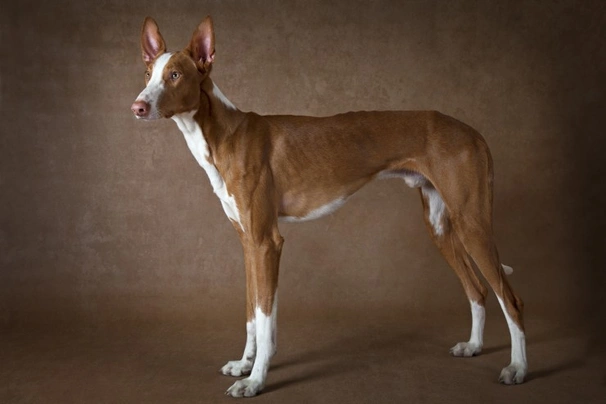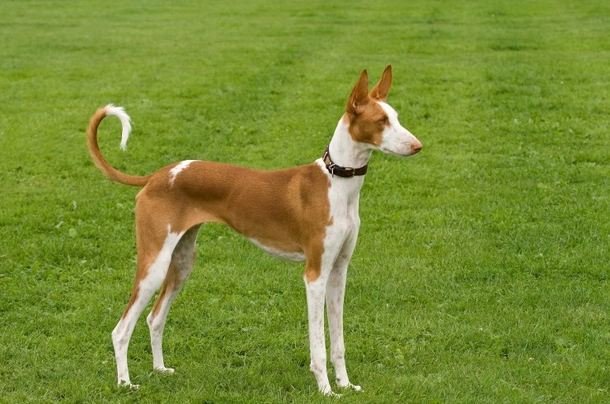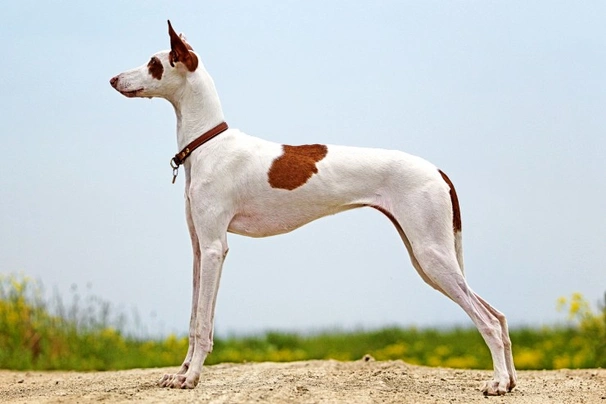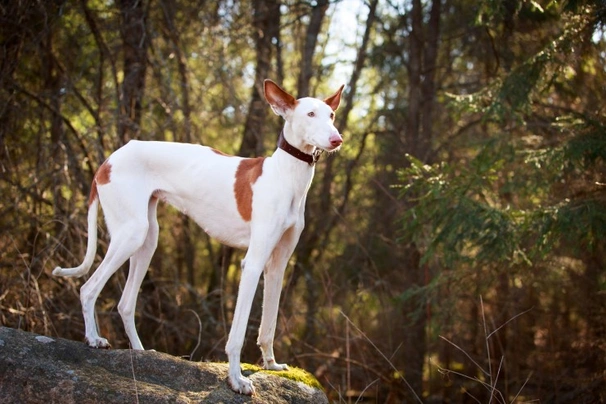Ibizan Hound
Introduction of the Ibizan Hound
The Ibizan Hound is an athletic lithe and tall dog that commands a lot of attention thanks to their noble and proud looks. They have been highly prized in many European countries including Spain but are not as popular here in the UK remaining pretty much an unknown. However things are changing as more people are becoming aware of these attractive dogs and the fact they boast such kind and loyal natures. With this said very few Ibizan Hound puppies are registered with the Kennel Club every year which makes finding a breeder a bit challenging.
History of the Ibizan Hound
The Ibizan Hound is thought to be one of the most ancient hound breeds on the planet although their true origins remain a bit of a mystery. There are images of very similar looking dogs on the walls of Egyptian tombs and on ancient pottery which dates back to 5000 years ago. It is thought that the breed was developed when similar dogs landed on Elvissa when Phoenician traders visited the island to trade.
These dogs were used to hunt and proved to be excellent at the task they were bred to do. With this said the hounds we see today are very much like the dogs of ancient times with the breed not having changed that much over the thousands of years they have been in existence. Ibizan Hounds are still used to work in the Balearic Islands as well as in mainland Spain and over the years they have become more well known in other parts of the world although they are still quite rarely seen outside of their native land.
Appearance of the Ibizan Hound
Height at the withers: Males 56 - 74 cm Females 56 - 74 cm
Average weight: Males 20 - 29 kg Females 20 - 29 kg
The Ibizan Hound is a large athletic and leggy dog that boasts being light on their feet even though they are extremely powerful looking. Their heads are long and fine with dogs boasting a definite and prominent occipital bone but no clearly defined stop. Their muzzles are slightly convex and their noses are flesh coloured with dogs boasting stron clean jawlines.
Their eyes are almond shaped and amber in colour with Ibizan Hounds having a very expressive look in them. Ears are thin large and quite stiff with dogs always on the alert and holding them erect. The Ibizan Hound has a strong jaw with a perfect scissor bite where their upper teeth neatly overlap their lower ones.
Necks are long and very lean being muscular with dogs carrying them slightly arched which adds to their noble and elegant look. Their shoulders are lean yet strong with dogs having long straight legs and steep shoulder blades. Their backs are level but slope gently to the rump with dogs having flat ribcages and bellies are nicely tucked up and breast bones being very prominent.
Their hindquarters are lean but strong with dogs having long second thighs and their feet boast having well arched toes light coloured nails and thick paw pads. An Ibizan Hound has a long thin tail that's set low which dogs carry high when alert or excited.
When it comes to their coat the Ibizan Hound can either have a smooth or rough one but in either case the hair is always hard and dense lying close to a dog's body. The hair is longer under their tail as well as on the backs of their legs. Accepted breed colours are as follows:
- Chestnut
- Chestnut and white
- Lion
- Red and white
- White
- White and chestnut
- White and red
Temperament of the Ibizan Hound
The Ibizan Hound is reputed to be a kind calm and intelligent dog that loves nothing better than to please. However they are not the best choice for first time owners because these dogs need to be trained and handled by people who are familiar with the breed or similar type of high energy hound. They take a long time to grow up and mature which is more mentally than physically. This has to be taken into account when training them. It takes a lot of patience and understanding to train an Ibizan Hound but the effort is very worthwhile and rewarding.
Even when well socialised and trained from a young age the Ibizan Hound is not known to be the most obedient of characters. They are very easily distracted and will happily take off after something they have spotted in the distance totally ignoring the "recall" command.
Intelligence / Trainability of the Ibizan Hound
The Ibizan Hound is known to be an intelligent dogs and they love to please which means they are fairly easy to train. However their education and socialisation has to begin when dogs are very young for them to mature into well-rounded adult dogs. With this said they are very sensitive by nature and much like many other hounds they do not respond well to any sort of harsh correction or heavy handed training methods. They do however answer well to consistent positive reinforcement training techniques as long as their handlers are always fair. It's important to focus on the "recall" command early in an Ibizan Hound's training.
Children and other
Ibizan Hounds are generally known to be placid yet fun-loving dogs in a home environment and they thrive on human contact which includes being around children. With this said because they are so sensitive by nature children need to be taught how to behave around an Ibizan Hound and not to get too loud or boisterous around them. Any interaction between children and dogs should be well supervised to make sure things stay nice and calm.
They are known to be pretty good around other dogs and rarely would an Ibizan Hound show any sort of aggressive behaviour towards them. However care has to be taken when they are around smaller animals and pets which includes cats because an Ibizan Hound would see them as fair "game" with disastrous results.
Health of the Ibizan Hound
The average life expectancy of an Ibizan Hound is between 12 and 14 years when properly cared for and fed an appropriate good quality diet to suit their ages.
Like so many other breeds the Ibizan Hound is known to suffer from a few hereditary health issues which are worth knowing about if you are planning share your home with one of these active and good looking dogs. The conditions that seem to affect the breed the most include the following:
- Seizures
- Allergies
Caring for the Ibizan Hound
As with any other breed Ibizan Hounds need to be groomed on a regular basis to make sure their coats and skin are kept in top condition. They also need to be given regular daily exercise to ensure they remain fit and healthy. On top of this dogs need to be fed good quality food that meets all their nutritional needs throughout their lives.
Grooming of the Ibizan Hound
Thanks to their tight smooth and short coats the Ibizan Hound is low maintenance when it comes to keep things tidy. With this said a weekly brush is a great way of keeping their coats glossy and their skin in good condition. It also allows you to check a dog over for any lumps and bumps or injuries. It's important to towel dry an Ibizan Hound after they have been out for a walk in the rain because having so little coat means they can quickly feel the cold and catch a chill.
Their coat grows throughout the year but like other breeds they do tend to shed more during the Spring and then again in the Autumn when more frequent brushing may be necessary to keep on top of things. It's also important to check a dog's ears on a regular basis and to clean them when necessary. If too much wax is allowed to build up in a dog's ears it can lead to a painful infection which can be hard to clear up. In short prevention is often easier than cure when it comes to ear infections.
Exercise of the Ibizan Hound
The Ibizan Hound is a high-energy dog and as such they need to be given a minimum of 2 hour's vigorous exercise every single day for them to be truly happy well-rounded dogs. They are not suited to city living but are an ideal choice for people who live in the country and who are familiar with the breed or this type of high-energy dogs.
A shorter walk in the morning would be fine but a longer more interesting one in the afternoon is a must. These dogs also like to be able to roam around a back garden as often as possible so they can really let off steam. However the fencing has to be extremely secure to keep one of these beautiful dogs in because if they find a weakness in the fence they will soon escape out and get into all sorts of trouble.
With this said Ibizan Hound puppies should not be given too much exercise because their joints and bones are still growing and too much pressure on them could result in causing a dog a few problems later on in their lives. They should not be allowed to jump up or off furniture nor should they be allowed to run up and down the stairs because this puts too much pressure on their still growing joints and limbs.
Feeding of the Ibizan Hound
If you get an Ibizan Hound puppy from a breeder they would give you a feeding schedule and it's important to stick to the same routine feeding the same puppy food to avoid any tummy upsets. You can change a puppy's diet but this needs to be done very gradually always making sure they don't develop any digestive upsets and if they do it's best to put them back on their original diet and to discuss things with the vet before attempting to change it again.
Older dogs are not known to be fussy or finicky eaters but this does not mean you can feed them a lower quality diet. It's best to feed a mature dog twice a day once in the morning and then again in the evening making sure it's good quality food that meets all their nutritional requirements. It's also important that dogs be given the right amount of exercise so they burn off any excess calories or they might gain too much weight which can lead to all sorts of health issues. Obesity can shorten a dog's life by several years so it's important to keep an eye on their waistline from the word go.
Ibizan Hound price
If you are looking to buy an Ibizan Hound you would need to pay anything from £300 to over £500 for a well-bred pedigree puppy. The cost of insuring a male 3-year-old Ibizan Hound in northern England would be £21.20 a month for basic cover but for a lifetime policy this would set you back £41.20 a month (quote as of May 2016). When insurance companies calculate a pet's premium they factor in several things which includes where you live in the UK and a dog's age and whether or not they have been neutered or spayed.
When it comes to food costs you need to buy the best quality food whether wet or dry to feed your dog throughout their lives making sure it suits the different stages of their lives. This would set you back between £40 - £50 a month. On top of all of this you would need to factor in veterinary costs if you want to share your home with an Ibizan Hound and this includes their initial vaccinations their annual boosters the cost of neutering or spaying your dog when the time is right and their yearly health checks all of which quickly adds up to over a £1000 a year.
As a rough guide the average cost to keep and care for an Ibizan Hound would be between £70 to £100 a month depending on the level of insurance cover you opt to buy for your dog but this does not include the initial cost of buying a pedigree puppy.



